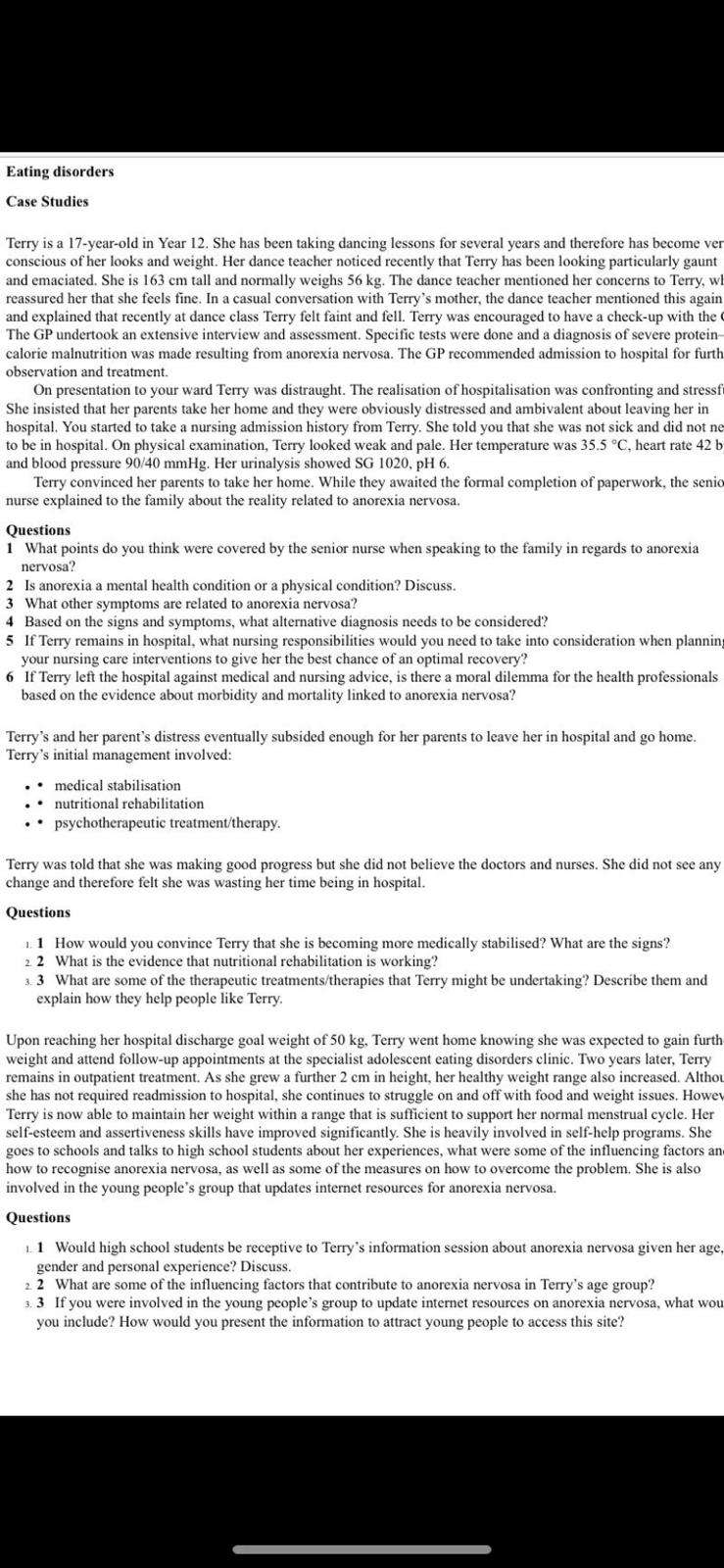Transcribed Image Text from this Question
Eating disorders Case Studies Terry is a 17-year-old in Year 12. She has been taking dancing lessons for several years and therefore has become ver conscious of her looks and weight. Her dance teacher noticed recently that Terry has been looking particularly gaunt and emaciated. She is 163 cm tall and normally weighs 56 kg. The dance teacher mentioned her concerns to Terry, wl reassured her that she feels fine. In a casual conversation with Terry’s mother, the dance teacher mentioned this again and explained that recently at dance class Terry felt faint and fell. Terry was encouraged to have a check-up with the The GP undertook an extensive interview and assessment. Specific tests were done and a diagnosis of severe protein calorie malnutrition was made resulting from anorexia nervosa. The GP recommended admission to hospital for furth observation and treatment. On presentation to your ward Terry was distraught. The realisation of hospitalisation was confronting and stressfi She insisted that her parents take her home and they were obviously distressed and ambivalent about leaving her in hospital. You started to take a nursing admission history from Terry. She told you that she was not sick and did not ne to be in hospital. On physical examination, Terry looked weak and pale. Her temperature was 35.5 °C, heart rate 42 b and blood pressure 90/40 mmHg. Her urinalysis showed SG 1020, pH 6. Terry convinced her parents to take her home. While they awaited the formal completion of paperwork, the senio nurse explained to the family about the reality related to anorexia nervosa. Questions 1 What points do you think were covered by the senior nurse when speaking to the family in regards to anorexia nervosa? 2 Is anorexia a mental health condition or a physical condition? Discuss. 3 What other symptoms are related to anorexia nervosa? 4 Based on the signs and symptoms, what alternative diagnosis needs to be considered? 5 If Terry remains in hospital, what nursing responsibilities would you need to take into consideration when plannin your nursing care interventions to give her the best chance of an optimal recovery? 6 If Terry left the hospital against medical and nursing advice, is there a moral dilemma for the health professionals based on the evidence about morbidity and mortality linked to anorexia nervosa? Terry’s and her parent’s distress eventually subsided enough for her parents to leave her in hospital and go home. Terry’s initial management involved: .. medical stabilisation nutritional rehabilitation psychotherapeutic treatment/therapy. Terry was told that she was making good progress but she did not believe the doctors and nurses. She did not see any change and therefore felt she was wasting her time being in hospital. Questions 11 How would you convince Terry that she is becoming more medically stabilised? What are the signs? 2 2 What is the evidence that nutritional rehabilitation is working? 3.3 What are some of the therapeutic treatments/therapies that Terry might be undertaking? Describe them and explain how they help people like Terry. Upon reaching her hospital discharge goal weight of 50 kg, Terry went home knowing she was expected to gain furth weight and attend follow-up appointments at the specialist adolescent eating disorders clinic. Two years later, Terry remains in outpatient treatment. As she grew a further 2 cm in height, her healthy weight range also increased. Althou she has not required readmission to hospital, she continues to struggle on and off with food and weight issues. Howev Terry is now able to maintain her weight within a range that is sufficient to support her normal menstrual cycle. Her self-esteem and assertiveness skills have improved significantly. She is heavily involved in self-help programs. She goes to schools and talks to high school students about her experiences, what were some of the influencing factors an how to recognise anorexia nervosa, as well as some of the measures on how to overcome the problem. She is also involved in the young people’s group that updates internet resources for anorexia nervosa. Questions 11 Would high school students be receptive to Terry’s information session about anorexia nervosa given her age, gender and personal experience? Discuss. 2 2 What are some of the influencing factors that contribute to anorexia nervosa in Terry’s age group? 3.3 If you were involved in the young people’s group to update internet resources on anorexia nervosa, what wou you include? How would you present the information to attract young people to access this site?
(Visited 1 times, 1 visits today)




